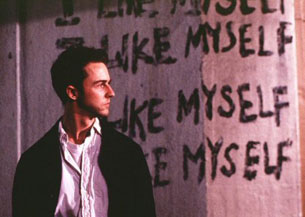Viking Night
Fight Club
By Bruce Hall
February 23, 2010
Jack (the central character does not actually have a name) is a product recall analyst for a major automobile manufacturer. Years of remorselessly translating human deaths into statistical data have left him riddled with guilt, which he tries to soothe by burying himself in his work, accumulating nice clothes and flashy furniture. Additionally, the constant travel has left him suffering from chronic insomnia. Jack is a miserable person who derives his sense of identity from his job, his income and his worldly possessions. He's unhappy living this way, but he can't imagine any other way to live. On the advice of a doctor, he begins attending self help groups and quickly becomes fascinated by how insignificant his own pain seems against the suffering of others. Soon, he begins attending clinics for terminal and chronic diseases – not because he is dying, but because it helps him reconnect with his humanity. And no doubt, seeing someone worse off than you is a temporary but effective way to feel a little better about almost anything. But Jack's newfound sense of well being is shattered when a mysterious girl begins shadowing him.
Marla is clearly the same sort of person as Jack; not bodily ill but spiritually empty, and he initially hates her for it – the sort of hatred that makes it clear how much he's attracted to her. But Marla's presence reminds Jack that he's just hiding from reality and not really taking productive steps to solve his problems. After a brief confrontation, she would seem to be out of his life for good, although Jack takes conspicuous care to ensure that he might see her again. But the damage is done, and Jack's desperation – and insomnia – has returned. Things begin to seem hopeless again until Jack takes a fateful business trip. Through a highly unusual series of events, he becomes acquainted with a mysterious stranger named Tyler Durden, who seems to share Jack's disenchantment with the human condition. They become fast friends and after an evening of drunken revelry, discover that they find bare knuckle boxing to be an exhilarating form of liberation. Fight Club is born, and it isn't long before scores of other rudderless, angst ridden middle class men have joined the ranks. Much like professional fighters, the competition is their release; overcoming the will of another gives them a sense of accomplishment and belonging.
The fisticuffs in Fight Club are a source of controversy, as the boxing matches are raw, and occasionally graphic. The scenes are intentionally unsettling; however, the violence in Fight Club is meant primarily to be metaphorical. This is a story mainly aimed at men, and one of the central themes is the idea that successive generations of the able bodied have been raised in a world that really does not require their participation. Tyler Durden suggests that the machinery and institutions of our society generally function on their own, regardless of who runs them or who is subject to them. Men now have nothing to build, nothing to struggle for and nothing to overcome. We work so that we can afford to fill our homes and lives with pointless diversions and amusements, distracting us from the repetitive nature of our existence. For a species programmed to be hunters and gatherers, this is a fate worse than death. Tyler argues that Fight Club gives these men what they need – a challenge and an outlet – and that they're better for it. At first, Jack agrees and feels that he has at last found meaning in his life. And then, things change.
Continued:
1
2
3
|
|
|
|




